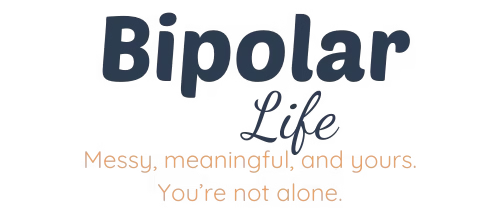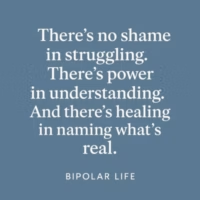🌀 What Does a Bipolar Episode Really Feel Like?
There’s something impossibly hard about trying to describe what a bipolar episode feels like or looks like—especially when you’re in it. The words never quite fit. The metaphors often fall short—and sometimes, they carry stereotypes or hurtful assumptions that reduce bipolar to a punchline instead of a lived reality. And sometimes, even you don’t fully understand what’s happening until you’re on the other side of it.
But here’s the truth: the more we talk about what bipolar feels like—not just what a textbook episode is supposed to look like—the more we can heal, connect, and support each other.
This is one of those conversations. These are some thoughts from my experience with bipolar, they are not “typical” because everyone experiences bipolar just a little differently.
🌪️ When Everything Feels Too Big, Too Possible, Just Too: Mania
A manic episode can feel like the world has cracked open in technicolor—everything feels big, urgent, wildly possible, and just… too much to hold.
It might start small—maybe you feel extra productive or unusually confident. But sometimes, it doesn’t build slowly at all; it goes straight into full-blown mania, catching you and everyone else off guard.
You might not feel like your thoughts are racing—but everything feels urgent. Your mind skips ahead, layering ideas on top of each other before you can finish one. You don’t notice yourself talking fast, but conversations become one-sided, filled with leaps that only make sense to you. At first, it might feel like heightened clarity or productivity. But soon, that clarity blurs into chaos. What once felt inspired now feels scattered—or agitated.
Sleep becomes optional—or you sleep, but it’s not restful. Your body is wired, your mind still buzzing. People might call it “a good mood,” but others might say you’re “taking over,” being too intense, or even intimidating. When you feel like you can conquer the world, what do you need other people for? Their concerns might feel irrelevant, their pace too slow. It’s not about arrogance—it’s about being swept up in something that feels bigger than anything else around you.
You might spend money you don’t have, talk endlessly, take risks that scare your loved ones, or lash out in a blur of impulsivity. And at the time, it might feel incredible—like you’re finally living fully. But mania is a peak, and when you fall from a peak, no matter how far, it’s still a serious fall. The crash brings confusion, sometimes shame, and a sense of emotional whiplash. You’re left trying to piece together what happened, what you said, or what damage might need repairing—all while the energy that fueled it has vanished.
🌫️ When Everything Feels Too Heavy: Depression
If mania is all brightness and urgency, bipolar depression is like the world goes dim. Everything that was once in color now feels black and white—not just visually, but emotionally and intellectually. Joy, curiosity, motivation—all fade to gray. The contrast is stark, and that shift can feel jarring, even cruel.
It can be hard to move, hard to speak, hard to care. Everything you once enjoyed feels distant, and even the smallest tasks—brushing your teeth, answering a message—can feel impossible. If mania is a peak, this is at least a fall to the ledge. And sometimes, you don’t stop there—you fall further, into the valley below. That’s where the darkness turns dangerous—when depression moves beyond numbness into suicidal thinking. I once called my husband and told him he had to give me three reasons to live—and they couldn’t be him or the kids. Because in that moment, even love wasn’t enough to pull me out. That’s the cruelty of this illness: it makes survival feel like a burden.
This kind of depression goes beyond sadness. It can feel like you’re watching life from behind glass. You want to reach out, to ask for help—but you can’t find the energy or the words. And depending on how you were perceived during your manic state, there may be no one left to reach out to. While you were on the peak, you may have pushed people away—or overwhelmed them so completely that they quietly stepped back. Then comes the stigma. The fear of being labeled, misunderstood, or dismissed. And even when you do ask for help, it often feels like you have to be too clear—spelling out exactly how bad it is, just to be taken seriously. Sometimes, by the time you get to that point, it feels easier to stay silent.
And for some, the thoughts turn dark. You may think about ending the pain—not because you want to die, but because living like this feels unbearable. You might feel useless, broken, or like a “bad person” for not being able to just snap out of it. And sometimes, it’s not even active suicidal ideation—it’s quieter than that. The thought of just stepping into traffic, of something happening to you instead of by you, is enough to keep the depression lingering, even during what looks like a manic episode. That low hum of despair doesn’t always disappear when the energy returns. If that’s where you are, please know: you are not alone. And there is help.
🛑 If You’re Struggling Right Now
You don’t have to go through this alone. If you’re feeling unsafe, overwhelmed, or like the pain is too much:
🇺🇸 United States
- Call or text 988 (Suicide & Crisis Lifeline – free, 24/7, confidential)
🌍 International Support
- Befrienders Worldwide – Find emotional support in your country
- Find A Helpline – Verified helplines by location
- Or contact local emergency services if you are in immediate danger
🧠 If reaching out feels impossible right now:
- Tell someone—even if all you can say is “I’m not okay.”
- Write it down—a note, a message, a list of what hurts.
- Promise yourself one more day—and do one small thing to care for yourself in this moment.
You matter. Your pain is real. And there is support for you—right now, as you are.
🔀 When Opposites Collide: Mixed States
If mania and depression are two ends of a spectrum, mixed states are the storm that brews when both crash into each other. They’re confusing, exhausting, and often the most dangerous type of bipolar episode—precisely because they’re so hard to recognize, even while you’re in them.
You might feel agitated and empty at the same time. Energetic but hopeless. Suicidal but restless. You may cry uncontrollably while your thoughts spiral too fast to follow. Your body wants to move, to do something—but your mind keeps whispering, what’s the point? Or, just as often, your brain wants to take action, to fix something, to escape—but your body is too weighed down by exhaustion and despair to even get off the couch. The anxiety and inner chaos create so much tension, it becomes physically draining—your mind is bouncing off the walls, while your body just… can’t.
“It’s like your body wants to run a marathon while your brain wants to disappear.”
Mixed states can look different for everyone. For some, it feels like every emotion is happening at once and none of them make sense. For others, it’s a kind of psychological whiplash—switching rapidly between euphoria and despair in a single day or even a single hour.
What makes this especially dangerous is that the energy of mania combines with the despair of depression—and that’s a volatile mix. You may have just enough drive to act on dark thoughts. You may feel like you’re unraveling at double speed.
Mixed states can leave you feeling like you’re breaking apart from the inside—torn between too many emotions and not enough clarity. They’re hard to explain, hard to track, and sometimes hard to survive. But they are real, and you are not imagining the intensity. If you’ve felt like something’s wrong but couldn’t name it, if you’ve felt both everything and nothing at once—you’re not alone. Naming it is the first step. Understanding it is the next. And with time, support, and the right tools, these episodes can become less terrifying—and more manageable.
💙 You’re Not Alone in This
Bipolar disorder isn’t just a diagnosis—it’s an experience that shifts your inner world in ways that are hard to explain and harder to live through. Whether you’ve felt the high of mania, the weight of depression, or the chaos of mixed states, your story is real. Your pain is valid. And you are not too much.
This post isn’t meant to define every experience—but to open the door for honest conversation. To help you put words to the storm. To remind you that what you feel isn’t a failure—it’s part of something that can be understood, treated, and managed with time and support.
There’s no shame in struggling. There’s power in understanding. And there’s healing in naming what’s real. Acknowledgment doesn’t just give you language—it breaks stigma. It opens the door to getting support, finding help, and finally being met with care instead of silence.
📝 Reflection Prompt
“Which part of my bipolar experience feels the hardest to describe—and what metaphor, image, or memory helps me explain it?”
Use this as a way to explore your own story. There’s no right answer. Just your truth.

